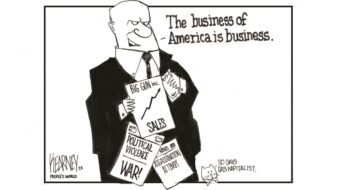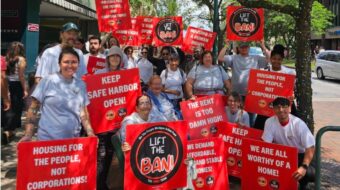
LONG ISLAND, N.Y.—In the prologue to his book Evicted, Professor Matthew Desmond notes a line from Langston Hughes: “I wish the rent was heaven sent.” Today, some 60 years after his death, activists worldwide are yelling, “The rent is too damn high.”
This sentiment is no truer than on Long Island in the year 2023. The most recent data, compiled by the Regional Planning Association, profiles town by town the rent and owner-burdened percentage of its residents. Not surprisingly, the towns that have the most burdened residents are Hempstead, Freeport, and Bellport, which are among the poorest areas on Long Island.
As a housing advocate for several years, I have met a number of tenants who inhabit the most vulnerable areas on Long Island. Many of these people are undocumented and a large percentage are people of color.
Most of the tenants who reside in “vulnerable areas” pay their rent to an LLC—a limited liability company—not a person. They often have no idea who actually owns the building in which they live.
The LLC structure enables landlords to limit their individual legal responsibilities while still benefitting from the tax savings of a partnership.
In the publication Shelter Force, Brian Mykuln and Elora Raymond detailed the technicalities of these invisible property owners. In their article, titled “When landlords hide behind LLCs,” they point out how difficult it sometimes is to know who a tenant’s landlord really is.
It seems that more often than not LLC-owned buildings are the ones where conditions are deteriorating, maintenance goes uncompleted, and there is a lack of accountability.
A prime example of this on Long Island are the properties belonging to Bradford Mott, the owner of more than 30 buildings held under more than 30 LLCs. All the LLCs operate under different names. According to many tenants, several of these buildings are deplorable, but residents are afraid to speak up because of their immigration status.
How do we fight back against these modern-day Simon Legrees is a question that often arises when attempting to organize tenants. We, as advocates, need to put pressure on our elected officials to better regulate the LLC shell game and make landlords more accountable when it comes to the responsibilities of ownership.
On Long Island specifically, the attorneys generals of Nassau and Suffolk Counties should publicly call out the worst landlords, just as NYC Public Advocate Jumaane Williams has been doing during his term.
We must limit the amount of rent that a landlord can charge a tenant; 30% of a tenant’s income/or benefits received would be a fair and equitable start.
Lastly, the Section 8 Voucher System needs to be greatly enhanced, and landlords must be required to accept vouchers. Large corporate builders/landlords must no longer be given PILOT (Payment in lieu of Taxes) benefits, which allow them to build without paying their fair share of real estate taxes.
The PILOT program doesn’t benefit anybody other than large landlords; it hurts the working class and the working poor who get stuck with the tax bills that are not paid by big property developers.
Addressing the lack of housing for working and non-working poor throughout Long Island will not be an easy challenge. Long Island voters in both Nassau and Suffolk Counties are turning Long Island “red” and came within a whisker of electing a right-wing governor at the last election.
Gov. Kathy Hochul initially favored the building of Accessory Dwelling Units as a way to reduce the problem of affordable housing, however, after seeing the opposition from many people living in the suburbs, she rescinded the proposal. ADUs would possibly reduce the need for people to be sent to emergency shelters and lessen their reliance on the Department of Social Services.
The cost of a two-bedroom apartment in relation to income earned is astonishing. In 2022, data showed that to afford a two-bedroom apartment and not be considered rent-burdened, a person or household needed to earn $39.71/hour. This equates to an annual income in excess of $88,000.
State, local, and federal governments must make housing for every person in this country a top priority. As we in the Poor People’s Campaign state, “Housing is a Human Right.”
As with all op-eds published by People’s World, this article reflects the opinions of its author.
We hope you appreciated this article. Before you go, please support great working-class and pro-people journalism by donating to People’s World.
We are not neutral. Our mission is to be a voice for truth, democracy, the environment, and socialism. We believe in people before profits. So, we take sides. Yours!
We are part of the pro-democracy media contesting the vast right-wing media propaganda ecosystem brainwashing tens of millions and putting democracy at risk.
Our journalism is free of corporate influence and paywalls because we are totally reader supported. At People’s World, we believe news and information should be free and accessible to all.
But we need your help. It takes money—a lot of it—to produce and cover unique stories you see in our pages. Only you, our readers and supporters, make this possible. If you enjoy reading People’s World and the stories we bring you, support our work by donating or becoming a monthly sustainer today.












Comments